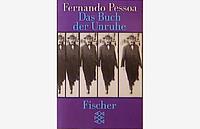Take a photo of a barcode or cover
challenging
dark
emotional
reflective
sad
slow-paced
mysterious
relaxing
slow-paced
This is a collection of amazing prose fragments that Pessoa wrote throughout his life as various other people he made up and wrote as, finally collected into one book. None of this was published while he was alive, so it's mildly surreal to see how pieces he wrote as various other people all end up coming together. Recommended to me as part of my 2023 reads, and highly recommended on my end.
“My soul is a hidden orchestra; I know not what instruments, what fiddlestrings and harps, drums and tambours I sound and clash inside myself. All I hear is the symphony.”
There should be more books like The Book of Disquiet: texts that contemplate existence, writing, and labor, all in meandering prose that does not so much adhere to a plot as trace the inner intellectual obsessions of the narrator. Written as a diary, this book drips with the sincerity of someone who genuinely does not know how to cope with the limits on their own knowledge of themselves and the world around them, who is frustrated that they cannot escape their subjective experience and see the world objectively.
While I believe this book was a little bit too long and got repetitive at some points, I think that this book exemplifies why it is important to read in the first place: to challenge yourself intellectually and contemplate issues that ordinary life encourages you to ignore. Literature can protect you from complacency.
There should be more books like The Book of Disquiet: texts that contemplate existence, writing, and labor, all in meandering prose that does not so much adhere to a plot as trace the inner intellectual obsessions of the narrator. Written as a diary, this book drips with the sincerity of someone who genuinely does not know how to cope with the limits on their own knowledge of themselves and the world around them, who is frustrated that they cannot escape their subjective experience and see the world objectively.
While I believe this book was a little bit too long and got repetitive at some points, I think that this book exemplifies why it is important to read in the first place: to challenge yourself intellectually and contemplate issues that ordinary life encourages you to ignore. Literature can protect you from complacency.
Certainly, not a book to read for the plot but for the beauty of its language and the resonance of its ideas. Ordinary life, despite its monotony, has moments of beauty and depth.
"My soul is a hidden orchestra; I know not what instruments, what fiddlestrings and drums, clash and play inside me. I only know myself as a symphony."
"My soul is a hidden orchestra; I know not what instruments, what fiddlestrings and drums, clash and play inside me. I only know myself as a symphony."
This is one of the most beautiful books I've ever read.
There's no narrative, no plot, only a man giving his thoughts on the world and the human condition. It feels like a diary, and many of the chapters do, indeed, have dates, but most don't and even the ones that do aren't chronologically ordered, but rather placed, haphazardly, in any order. You might read several entries from 1932 only to find, many chapters later, that you're reading his thoughts from 1916. Not that it matters, the whole book could be read in any order, in any way, starting at the middle and moving backwards, or picking any random chapter you wanted. It makes no difference at all.
Pessoa writes using the heteronym 'Bernardo Soares', and tells us very little about himself other than where he works, his boss, the errand boy, with a few occasional references to the streets and the weather. More than anything, he concerns himself with the nature of existence, the tedium of life, the mystery of being alive. He writes beautifully, almost poetically, and is always accompanied by a sense of melancholy and, perhaps, even despair. The book reminded me of 'Journey to the end of the night' by Celine in its low opinion of humanity. Yet he also sees the beauty in life, and adores nature and art. He ponders the meaning of things and the emptiness too. It's exquisite.
I wouldn't recommend this book lightly. If you're someone who prefers a narrative, then this might not be your cup of tea. But if, like me, you enjoy books where opinions are given, ideas explored, and thoughts are allowed to spiral into fluid expression, then this is a glorious example of that.
The book was published long after he died which, given that he spends a moment towards the end of the book contemplating being rediscovered as a writer by later generations, fills me with joy.
There is so much sadness in the character. And you can just picture him, gazing from his window at night, seeking out a small piece of light.
There's no narrative, no plot, only a man giving his thoughts on the world and the human condition. It feels like a diary, and many of the chapters do, indeed, have dates, but most don't and even the ones that do aren't chronologically ordered, but rather placed, haphazardly, in any order. You might read several entries from 1932 only to find, many chapters later, that you're reading his thoughts from 1916. Not that it matters, the whole book could be read in any order, in any way, starting at the middle and moving backwards, or picking any random chapter you wanted. It makes no difference at all.
Pessoa writes using the heteronym 'Bernardo Soares', and tells us very little about himself other than where he works, his boss, the errand boy, with a few occasional references to the streets and the weather. More than anything, he concerns himself with the nature of existence, the tedium of life, the mystery of being alive. He writes beautifully, almost poetically, and is always accompanied by a sense of melancholy and, perhaps, even despair. The book reminded me of 'Journey to the end of the night' by Celine in its low opinion of humanity. Yet he also sees the beauty in life, and adores nature and art. He ponders the meaning of things and the emptiness too. It's exquisite.
There are ships sailing to many ports, but not a single one goes where life is not painful.”
I wouldn't recommend this book lightly. If you're someone who prefers a narrative, then this might not be your cup of tea. But if, like me, you enjoy books where opinions are given, ideas explored, and thoughts are allowed to spiral into fluid expression, then this is a glorious example of that.
The book was published long after he died which, given that he spends a moment towards the end of the book contemplating being rediscovered as a writer by later generations, fills me with joy.
There is so much sadness in the character. And you can just picture him, gazing from his window at night, seeking out a small piece of light.
It took me 6 years to finish this book, it was too good to want to read fast, each "chapter" can be read over and over again and you get something new out of each reading. This book could just be read over and over again, this is totally unique and wonderful and it's great to see that the entire world here seems to agree that Pessoa rules!
Hay pocos libros que, literalmente, puedan acompañarte toda una vida, y este lo es.
Creo que es un error intentar leerlo de un tirón. Lo mejor es dejar el libro en una mesa, a la vista, agarrarlo de vez en cuando, leer una o dos anotaciones en un momento en que te sientas receptivo y dejarse llevar por esa indescriptible prosa poética vanguardista y melancólica. El libro debe quedarse en esa mesa durante toda tu vida. Quizá te guste señalar aquellos textos que se te hacen especialmente bellos, para que en una segunda vuelta al libro puedas ir directamente a ellos. Habrá una segunda vuelta (y sucesivas), te lo garantizo.
Creo que nadie en la historia de la literatura ha sido capaz de hacer algo tan único con las palabras.
Creo que es un error intentar leerlo de un tirón. Lo mejor es dejar el libro en una mesa, a la vista, agarrarlo de vez en cuando, leer una o dos anotaciones en un momento en que te sientas receptivo y dejarse llevar por esa indescriptible prosa poética vanguardista y melancólica. El libro debe quedarse en esa mesa durante toda tu vida. Quizá te guste señalar aquellos textos que se te hacen especialmente bellos, para que en una segunda vuelta al libro puedas ir directamente a ellos. Habrá una segunda vuelta (y sucesivas), te lo garantizo.
Creo que nadie en la historia de la literatura ha sido capaz de hacer algo tan único con las palabras.
mysterious
reflective
sad
medium-paced
Plot or Character Driven:
N/A
Strong character development:
N/A
Loveable characters:
N/A
Diverse cast of characters:
N/A
Flaws of characters a main focus:
Complicated
I found his thoughts incredibly fascinating but at times became frustrated with his repetition of these same ideas over and over. At times I completely disagreed with him but also related to the essence of his message at a deeper level. Truly an enigma
challenging
inspiring
reflective
slow-paced
Plot or Character Driven:
Character
Strong character development:
Yes
Loveable characters:
Yes
Diverse cast of characters:
No
Flaws of characters a main focus:
Yes






